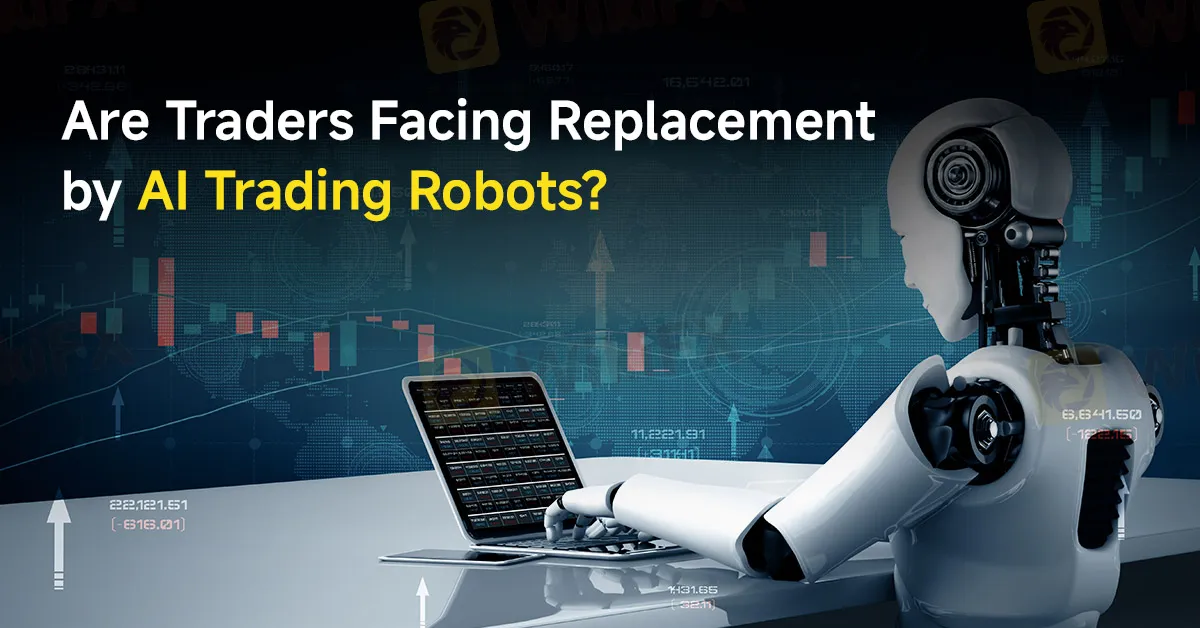简体中文
繁體中文
English
Pусский
日本語
ภาษาไทย
Tiếng Việt
Bahasa Indonesia
Español
हिन्दी
Filippiiniläinen
Français
Deutsch
Português
Türkçe
한국어
العربية
Are Traders Facing Replacement by AI Trading Robots?
Abstract:In the ever-evolving world of finance, the introduction of artificial intelligence (AI) trading robots is making waves, challenging the long-held dominance of human traders. Will human traders be replaced by AI trading robots eventually?

In the ever-evolving world of finance, the introduction of artificial intelligence (AI) trading robots is making waves, challenging the long-held dominance of human traders. According to verified trading records from MyFxBook and third-party validation, a new AI trading robot has generated an impressive $38,000 from a modest $5,000 investment within just one week. This exceptional performance has garnered global attention, prompting a critical examination of the transformative power of AI in trading and whether human traders can keep up.
AI trading robots leverage cutting-edge technology to analyse vast amounts of data, predict market trends, and execute trades with precision. The particular robot in question employs sophisticated algorithms to autonomously navigate the complexities of the financial markets, making split-second decisions that would be challenging for even the most seasoned human traders.
The flexibility offered by AI trading robots is noteworthy. Traders can choose from various trading speeds, ranging from slow and steady to fast and aggressive, allowing for tailored investment strategies. The ability to adapt and optimize trading patterns based on real-time data gives these robots a distinct advantage over their human counterparts.

Given the remarkable returns generated in such a short period, initial scepticism was understandable. The financial community is no stranger to grand claims, and promises of substantial returns often warrant caution. However, the full disclosure and independent verification by MyFxBook, a reputable third-party company known for its trade verification expertise, have quelled doubts. The validated performance of the AI trading robot has persuaded even the most cautious observers of its legitimacy and potential.
The rapid spread of this AI trading technology is undeniable. With 4,000 downloads to date, the robot is reportedly generating millions of dollars in daily profits for its users. Its user-friendly design, which allows for easy installation and immediate profitability, has further fuelled its popularity. Despite its growing acceptance, the future of AI trading robots remains shrouded in uncertainty. Rumours of interest from a large US-based hedge fund in acquiring the algorithm highlight the potential for significant industry shifts.
As AI trading robots continue to prove their efficacy, the question arises: can human traders keep up? The integration of AI in trading does not merely represent a technological advancement; it signifies a fundamental shift in how trading is conducted. The ability of AI to process and react to information at unprecedented speeds poses a challenge to human traders who rely on intuition, experience, and manual analysis.
However, the human element in trading is not entirely dispensable. The strategic thinking, emotional intelligence, and nuanced understanding of market sentiments that human traders bring to the table are aspects that AI, at least for now, cannot replicate fully. The future of trading may well lie in a hybrid model where AI handles data-intensive tasks, while human traders focus on strategic decision-making and oversight.
The advent of AI trading robots marks a revolutionary moment in the financial industry. With their proven ability to outperform traditional methods, these robots are set to redefine the landscape of trading. While human traders face the challenge of adapting to this new reality, their unique skills and insights will remain valuable. The true potential of AI in trading will likely be realized through a synergistic approach, combining the strengths of both machines and humans. As the industry evolves, staying informed and adaptable will be key to navigating this transformative era.

Disclaimer:
The views in this article only represent the author's personal views, and do not constitute investment advice on this platform. This platform does not guarantee the accuracy, completeness and timeliness of the information in the article, and will not be liable for any loss caused by the use of or reliance on the information in the article.
Read more

Bitpanda Secures Full Broker-Dealer License in Dubai
Bitpanda has officially obtained a full broker-dealer license from the Dubai Virtual Assets Regulatory Authority (VARA), marking a significant milestone in its international expansion. This approval, which follows preliminary authorization granted three months earlier, enables the European digital asset exchange to introduce its comprehensive suite of virtual asset services to investors in the United Arab Emirates (UAE).

Gold Surges to New Highs – Is It Time to Buy?
Recently, gold prices have once again set new records, surpassing $3,077 per ounce and continuing a four-week winning streak. Is It the Right Time to Invest?

Why Does the Yen's Exchange Rate Fluctuate Repeatedly?
JPY Exchange Rate Fluctuations: How Should Investors Respond?

Hantec Markets Launches InsightPro: AI-Powered Real-Time Trading Signal Tool for Traders
Hantec Markets introduces InsightPro, an AI-powered trading tool offering real-time market insights, signals, and analysis for better trading success.
WikiFX Broker
Latest News
Enlighten Securities Penalized $5 Million as SFC Uncovers Risk Control Failures
Why Are Financial Firms Adopting Stablecoins to Enhance Services and Stability?
Experienced Forex Traders Usually Do This Before Making a Lot of Money
Octa vs XM:Face-Off: A Detailed Comparison
When High Returns Go Wrong: How a Finance Manager Lost RM364,000
Bridging Trust, Exploring Best—WikiEXPO Hong Kong 2025 Wraps Up Spectacularly
Fidelity Investments Explores Stablecoin Innovation in Digital Assets Sector
Interactive Brokers Expands Crypto Trading with Solana, XRP, Cardano, and Dogecoin
SEC Ends Crypto.com Probe, No Action Taken by Regulator
Why More People Are Trading Online Today?
Currency Calculator







